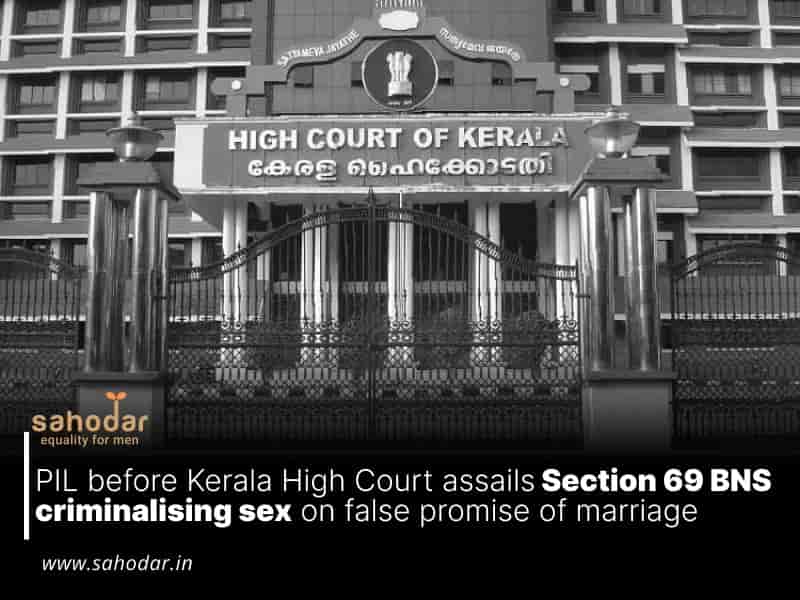The PIL has challenged Section 69 of BNS on the ground that it treats women as passive victims and violates the fundamental rights of members of the LGBTQIA+ community.
The Kerala High Court on Monday asked the Central government to respond to a petition challenging the constitutionality of Section 69 of the Bharathiya Nyaya Sanhita, 2023 (BNS), which makes sex on a false promise of marriage a criminal offense [Vimal Vijay v Union of India & Anr].
Under Section 69, anyone who has sexual intercourse with a woman by deceit or by falsely promising marriage can be punished with up to ten years in prison and may also be fined.
The petition, filed as a public interest litigation (PIL), challenges the provision on the grounds that it violates Articles 14, 15(1), 19(1)(a), and 21 of the Indian Constitution.
On Monday, a Division Bench consisting of Justice A Muhamed Mustaque and Justice S Manu issued a notice to the Central government and requested its response.
The petition, filed by Kerala-based lawyer Vimal Vijay, challenges the provision on the grounds that it was crafted from a patriarchal perspective, reflecting a regressive view of gender roles and treating women as passive victims who are incapable of making independent decisions about marriage or relationships.
“Section 69 BNS disseminates that a man alone is capable of making a promise of marriage is archaic. It is proliferating the idea that women are inherently irresolute, forceless, hapless and hence incapable of making sound decisions of marriage. It would portray that the women have no agency in her life with regard to such decisions and it would showcase the misogynistic and patriarchal mindset of the legislature,“ the plea said.
According to the petitioner, this bias violates Article 14 by unfairly classifying individuals based solely on sex, failing the test of reasonable classification.
The petition argues that Section 69 cannot be justified as protective discrimination under Article 15(3) (which allows the State to make special provisions for women and children), as it does not uplift or empower women but instead degrades them, diminishing their dignity and societal status.
The petitioner argues that the provision contradicts the landmark judgment in Joseph Shine v. Union of India (2019) 3 SCC 39, where the Supreme Court struck down Section 497 of the Indian Penal Code (which criminalized adultery) due to its patriarchal assumptions.
The PIL also raises concerns that Section 69 fails to address the rights of individuals in live-in relationships and those in the LGBTQIA+ community.
The petitioner argues that despite the constitutional recognition of LGBTQIA+ rights in Navtej Singh Johar v. Union of India (2018) 10 SCC 1, the Bharathiya Nyaya Sanhita (BNS) lacks a provision similar to Section 377 of the Indian Penal Code (IPC), which addressed sexual offenses committed deceitfully against LGBTQ individuals.
This absence of protection leaves LGBTQIA+ individuals vulnerable, violating their right to equality and protection from discrimination as guaranteed under Article 14, according to the petitioner.
The petitioner also argued that Section 69 criminalizes a basic human emotion—the right to consensual sex—protected by Article 19(1)(a) (freedom of expression) and Article 21 (protection of life and personal liberty) of the Constitution, as it is part of an individual’s right to privacy and a meaningful life.
The petitioner asked the Court to strike down Section 69 of the BNS for being vague, unclear, and discriminatory.
The petitioner was represented by advocates Sruthy N Bhat, Vipin Narayan, and Nanditha S.

